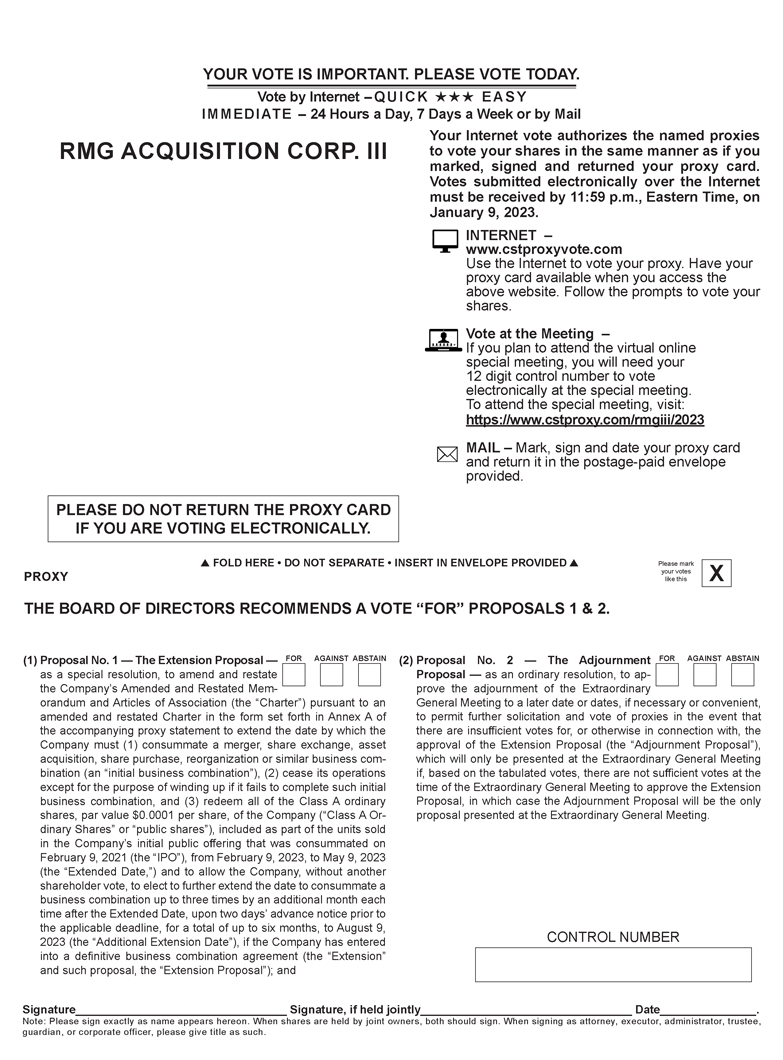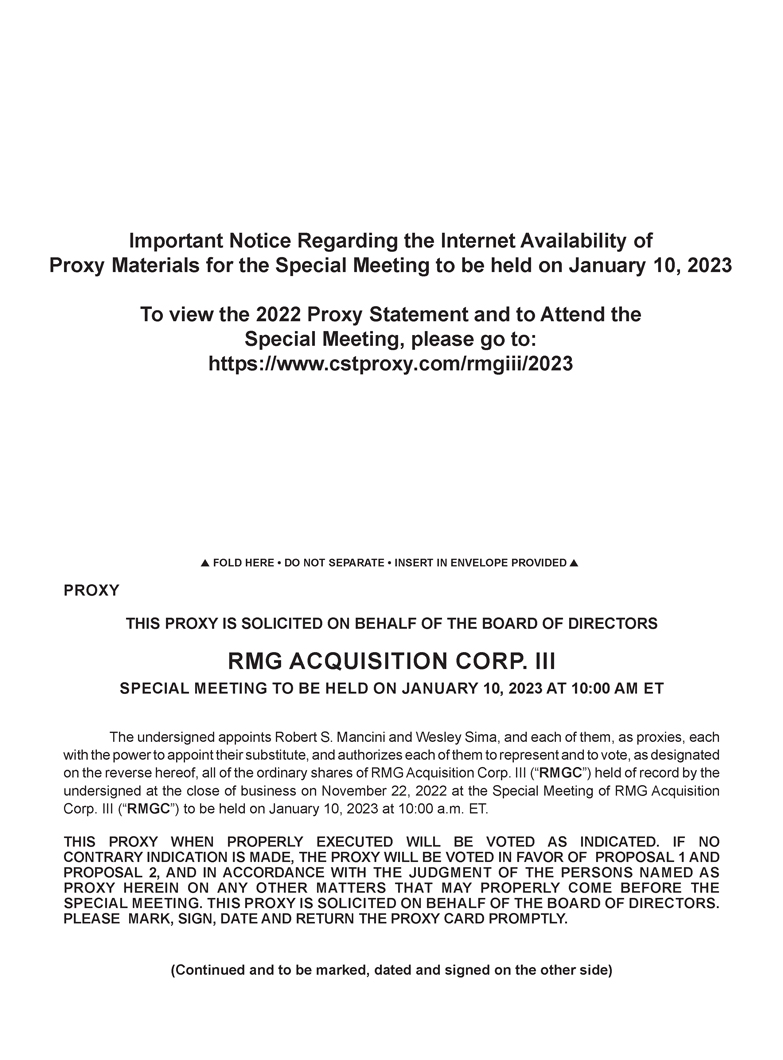To the extent any such purchases by the Sponsor, the Company’s directors, officers, advisors or any of their respective affiliates are made in situations in which the tender offer rules restrictions on purchases apply, the Company will disclose in a Current Report on Form 8-K prior to the Extraordinary General Meeting the following: (i) the number of public shares purchased outside of the redemption offer, along with the purchase price(s) for such public shares; (ii) the purpose of any such purchases; (iii) the impact, if any, of the purchases on the likelihood that the Extension will be approved; (iv) the identities of the securityholders who sold to the Sponsor, the Company’s directors, officers, advisors or any of their respective affiliates (if not purchased on the open market) or the nature of the securityholders (e.g., 5% security holders) who sold such public shares; and (v) the number of Ordinary Shares for which the Company has received redemption requests pursuant to its redemption offer.
The purpose of such share purchases and other transactions would be to increase the likelihood of (i) otherwise limiting the number of public shares electing to redeem and (ii) the Company’s net tangible assets (as determined in accordance with Rule 3a51(g)(l) of the Exchange Act) being at least $5,000,001.
If such transactions are effected, the consequence could be to cause the Extension to be effectuated in circumstances where such effectuation could not otherwise occur. Consistent with SEC guidance, purchases of shares by the persons described above would not be permitted to be voted for the Extension at the Extraordinary General Meeting and could decrease the chances that the Extension would be approved. In addition, if such purchases are made, the public “float” of our securities and the number of beneficial holders of our securities may be reduced, possibly making it difficult to maintain or obtain the quotation, listing or trading of our securities on a national securities exchange.
The Company hereby represents that any Company securities purchased by the Sponsor, the Company’s directors, officers, advisors or any of their respective affiliates in situations in which the tender offer rules restrictions on purchases would apply would not be voted in favor of approving the Extension Proposal.
Who is the Company’s Sponsor?
The Company’s sponsor is RMG Sponsor III, LLC, a Delaware limited liability company. The Sponsor currently owns an aggregate of 12,075,000 Ordinary Shares, all of which are Class B Ordinary Shares. The Sponsor is controlled by its manager, MKC Investments LLC (the “Manager”). Robert S. Mancini, the Company’s Chief Executive Officer and a Member of the Board, D. James Carpenter, the Chairman of the Board, and Philip Kassin, the Company’s President, Chief Operating Officer, and a member of the Board, are the managing members of the Manager. Each of the Company’s directors and officers, and each of the managing members of the Manager, is a U.S. citizen. The Sponsor is not controlled by and does not have substantial ties with a non-US person.
The Company’s ability to complete an initial business combination with a U.S. target company may be impacted if such initial business combination is subject to U.S. foreign investment regulations and review by a U.S. government entity, such as the Committee on Foreign Investment in the United States (“CFIUS”), and ultimately prohibited.
The Sponsor, RMG Sponsor III, LLC, is a Delaware limited liability company. The Company does not believe the Sponsor would be considered a foreign person because it is organized in a U.S. jurisdiction, is controlled and majority-owned by U.S. nationals and does not have substantial ties with a non-U.S. person.
In the event the Sponsor is considered a foreign person, however, the Company could also be considered a foreign person and would continue to be considered as such in the future for so long as the Sponsor has the ability to exercise control over the Company for purposes of CFIUS’s regulations. The Company could likewise be considered a foreign person if a foreign investor acquires a significant interest in the Company and is viewed as having the ability to exercise control over the Company. As such, an initial business combination with a U.S. business may be subject to CFIUS review, the scope of which includes controlling investments as well as certain non-passive, non-controlling investments in sensitive U.S. businesses and certain acquisitions of real estate even with no underlying U.S. business. If the Company’s potential initial business combination with a U.S. business falls within CFIUS’s jurisdiction, the Company may determine that it is required to make a mandatory filing or that it will submit a voluntary filing to CFIUS, or to proceed with the initial business combination without notifying CFIUS and risk CFIUS intervention, before or after closing the initial business combination. CFIUS may decide to delay the initial business combination, impose conditions to mitigate national security concerns with respect to such initial business combination or recommend that the U.S. president block the initial business combination or order the Company to divest all or a portion of a U.S. business of the combined company, which may limit the attractiveness of or prevent the Company from pursuing certain initial business combination opportunities that it believes would otherwise be beneficial to the Company and its shareholders. As a result, the pool of potential targets with which the Company could complete an initial business combination may be impacted, and it may be adversely affected in terms of competing with other special purpose acquisition companies which do not have similar foreign ownership issues.
Moreover, the process of government review, whether by the CFIUS or otherwise, could be lengthy and the Company has limited time to complete its initial business combination. If the Company cannot complete its initial business combination by February 9, 2023 or by the Extended Date or the Additional Extension Date, as applicable, if the Extension is approved, or such later date that may be approved by the Company’s shareholders, because the review process extends beyond such timeframe or because the initial business combination is ultimately prohibited by CFIUS or another U.S. government entity, the Company may be required to liquidate. If the Company liquidates, its public shareholders may only receive approximately $10.05 per share (based on the amount held in the Trust Account as of September 30, 2022 and estimated interest income and taxes post-September 30, 2022, and assuming the Extension is not approved), and the Company’s warrants will expire worthless. This will also cause you to lose the investment opportunity in a target company and the chance of realizing future gains on your investment through any price appreciation in the combined company.
What vote is required to approve the Extension Proposal?
Approval of the Extension Proposal requires a special resolution under Cayman Islands law, being the affirmative vote of the holders of a majority of at least two-thirds of the Ordinary Shares who, being present in person (including virtually) or represented by proxy and entitled to vote thereon and who do so in person or by proxy at the Extraordinary General Meeting. Ordinary Shares that are present virtually during the Extraordinary General Meeting constitute Ordinary Shares represented “in person.”
What vote is required to approve the Adjournment Proposal?
Approval of the Adjournment Proposal requires an ordinary resolution under Cayman Islands law, being the affirmative vote of the holders of a majority of the Ordinary Shares who, being present in person (including virtually) or represented or by proxy and entitled to vote thereon and who do so in person or by proxy at the Extraordinary General Meeting.
What if I want to vote against or don’t want to vote for any of the proposals?
If you do not want any of the proposals to be approved, you must abstain, not vote or vote against such proposal. A shareholder’s failure to vote by proxy or to vote in person at the Extraordinary General Meeting will not be counted towards the number of Ordinary Shares required to validly establish a quorum. Abstentions will be counted in connection with the determination of whether a valid quorum is established.
5

